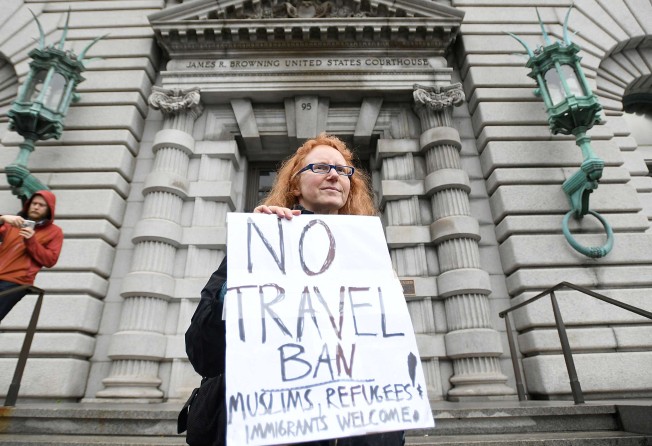State of confusion reigns as Trump weighs new travel ban

The White House sent conflicting signals Friday about how it would address an appeals court ruling that halted President Donald Trump’s ban on US entry by citizens from seven predominantly Muslim nations, and Trump said he may issue an entirely new immigration order to revise the ban.
A White House aide first said late Friday that the administration would not ask the Supreme Court to overturn the 9th U.S. Circuit Court of Appeals ruling, which refused to reinstate Trump’s travel ban after it had been blocked by a lower court judge. Soon after, reporters at the White House overheard Trump’s press secretary, Sean Spicer, asking who had made that statement. Minutes later, the aide distributed a different statement on paper.
“On background: to clarify, we could take the TRO to Supreme Court,” the statement read, referring to the lower court’s temporary restraining order against Trump’s travel ban. “We are reviewing all our options in the court system and confident we will prevail on the merits of the case. Additionally, we are actively pursuing other executive orders that will keep our country safe from terrorism.”
Trump himself, meanwhile, said aboard Air Force One that he has “a lot of other options” other than a Supreme Court appeal, “including just filing a brand new order.” He would not confirm whether that was his plan.
“It could very well be. I’d like to surprise you,” he said.
The administration’s moves came a day after the appeals court upheld a decision by a federal judge in Seattle to temporarily block Trump’s executive order barring citizens of Iran, Iraq, Libya, Somalia, Sudan, Syria and Yemen from entering the US.
LAWFARE: "Remarkably, in the entire opinion, the panel did not bother even to cite this (the) statute." A disgraceful decision!
— Donald J. Trump (@realDonaldTrump) February 10, 2017
In the immediate aftermath of the 26-page ruling from a three-judge panel, Trump vowed to press on with legal efforts to reinstate the travel ban. Trump first alluded to the possibility of a new immigration order at a news conference with Japanese Prime Minister Shinzo Abe earlier on Friday, before travelling to his Mar-a-Lago resort in Palm Beach, Florida.
“We’ll be doing something very rapidly having to do with additional security for our country; you’ll be seeing that sometime next week,” Trump said at the news conference, without offering any further detail.
Trump said aboard Air Force One that a new order ideally wouldn’t differ much from the original. “Very little,” he said.
“We are going to have very strong security in our country,” he said. “We are going to have people come into our country that want to be here for good reasons.”
The Trump administration argued that states have no right to sue to block the immigration order and that courts have no authority to review an executive branch decision on immigration policy.
But the panel of three judges from the 9th Circuit in San Francisco rejected those arguments, saying that the “federal judiciary retains the authority to adjudicate constitutional challenges to executive action.” Moreover, the panel found, the administration had shown “no evidence” that individuals from those seven nations had committed terrorist acts.
The Trump administration could appeal the decision to the US Supreme Court, but reversing the ruling would require a five-vote majority among the eight current members. If the high court fails to intervene, the case would return to US District Judge James Robart in Seattle.
Also on Friday, a judge on the appeals court in San Francisco asked for full-court reconsideration of the three-judge panel’s refusal to reinstate Trump’s travel ban.
The chief judge of the court on Friday directed lawyers for the federal government and for Washington state to file arguments over whether a rehearing by an 11-judge panel is appropriate. Typically a rehearing is only granted when a majority of active judges on the court votes for it.
The White House may consider issuing a new executive order that explicitly omits lawful permanent residents, or green-card holders, from the travel ban in an effort to head off legal challenges. Green-card holders from countries covered by the ban are allowed to re-enter the country, but are subject to “extreme vetting” procedures.
Josh Blackman, a law professor at South Texas College of Law in Houston, said Trump’s new order will need to make clear that it doesn’t apply to green-card holders to pass legal muster.
“That kills a huge chunk of the Ninth Circuit’s analysis,” he said.
The new order may also include reasons why residents from the seven nations are being singled out, although it’s unclear whether that will satisfy the judges who have questioned the directive’s constitutionality.
“The court requires evidence that people from those countries not only were suspect or arrested for planning, but indeed perpetrated acts of terror,” he said in an e-mail.
Spicer said Trump’s promise of a new action doesn’t signal any legal retreat from his original immigration order.
Despite the legal setback, Trump said Friday he felt “totally confident” that there would be “tremendous security for the people of the United States.” He offered the assurance despite also claiming he had learned alarming new information about threats facing the nation.
“I’ve learned tremendous things that you could only learn, frankly, if you were in a certain position, namely president, and there are tremendous threats to our country,” Trump said. “We will not allow that to happen. I can tell you that right now. We will not allow that to happen.”